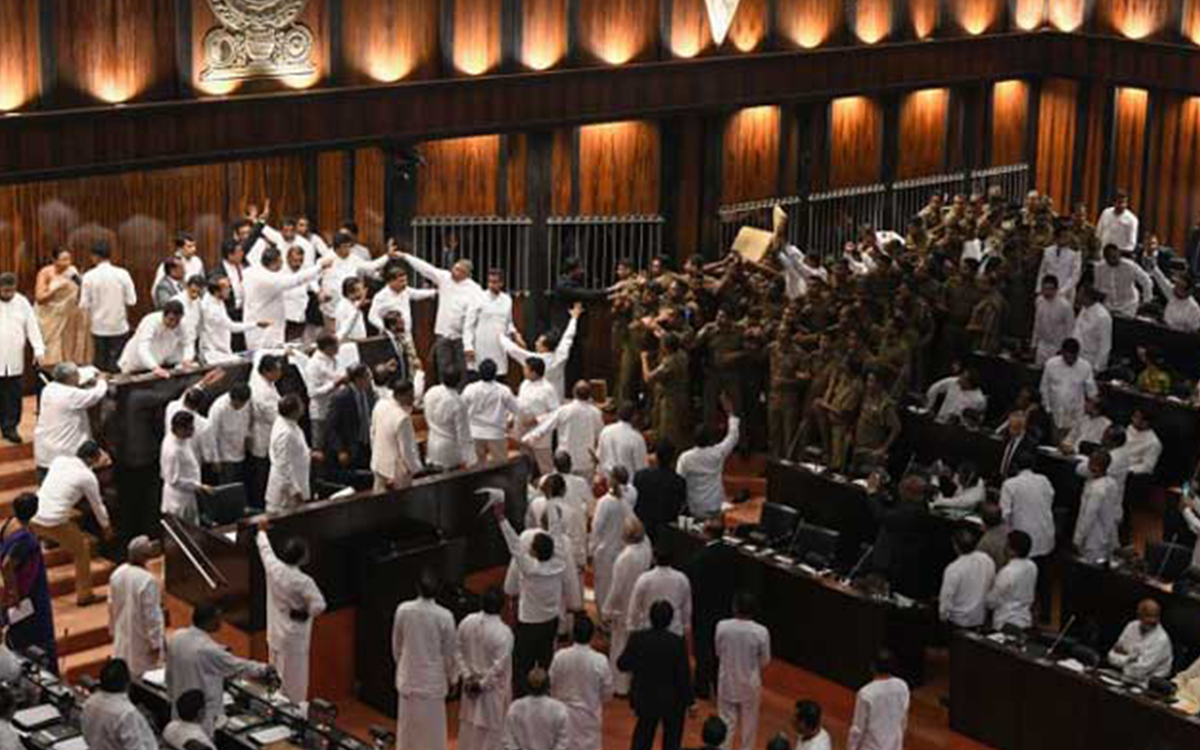Taken from – economynext
Out of 225 members of Sri Lanka’s parliament, 102 members are from political families, whose ancestors of close relatives have also been in the house, a legislator has said, which if correct, tops the hereditary peers of the UK’s House of Lords.
Bimal Rathnayake, a member of Sri Lanka’s Marxist People’s Liberation Party said one research had shown that 102 members of the current parliament came from hereditary political families.
He said children of existing or former legislator find it easy to get elected, riding on the heritage of their forefathers.
“About 80 members of them are highly spoiled children of politicians who have come to parliament on the strength of their parents and do not even attend a funeral of constituents,” Ratnayake said.
He was speaking at a forum organized by Verete Research a Colombo-based think tank which runs Manthri.lk, a website that tracks legislators.
In the UK, the House of Lords, which at one time mostly consisted of hereditary peers have now been exceeded by ‘life peers’ who are elevated from commoners.
In 1999, by a new law, hereditary peers were limited to 92 in a total house of about 800.
Sri Lanka has a European style legislating assembly dating back to British liberals who initiated universal adult franchise in the country in when it was under colonial rule. It was expected to be a House of Commons style assembly.
There is a degree of so-called ‘political families’ in many Western countries as well.
In South Asia, including in India, Bangladesh and Pakistan there are several powerful ‘political families’, who have held the reigns of power for long periods.
It was one of a series of steps that culminated in full self-determination in 1948.
After gaining control of the assembly, the legislators have voted themselves a number of privileges, including tax privileges in the style of a latter day nobility. There have been no ‘anti-aristocratic’ tax – protests of the style seen in Europe in the past.
Legislators, including hereditary ones, get tax free cars while ordinary citizens pay up to 200 percent or more tax for cars.
State workers have also been elevated above ordinary folk, and get tax free cars.
The elected ruling class also get lifetime pensions if they serve five years in office. So do a number of their personal staff.
As a result close family members, such as the wives or children of legislators are made into private secretaries and other staff to get a lifetime pension. There is no contributory pension for either the elected ruling class or state workers.
At one time the entire elected ruling class and state worker classes, were exempt from income tax.
The state workers are also bloated frequently by unemployed graduates, who engage in fasts in front of a railway station in the capital Colombo to get state jobs with lifetime pensions and avoid being in the ‘private sector’.
In general critics say, ‘private sector workers’ are referred to in the pejorative by statist members of the elected ruling class who glorify state workers. Private sector workers and are considered fair game to be taxed in multiple ways in the style of a neo-serfdom, so that higher salaries can be paid to state workers.
The British abolished the original serfdom in the country, which existed in the form of compulsory service tenure (wadawassam) bringing cash taxation paving the way for wider freehold land ownership.
The legislators have re-expropriated land and businesses of the citizens and vested them back in the state re-making into ‘Crown Land’ style holdings after gaining self-determination in 1948.
The legislating assembly also re-created state enterprises with monopolies, to which various functionaries close to the elected ruling class are appointed.
British liberals broke most of the state monopolies inherited from the Dutch East India Company in a series of reforms that started around the 1830s.
Legal reforms also brought in an European style Supreme Court. Key roles were played by William Colebrooke and Charles Cameron, a liberal in the tradition of utilitarianism.
Unlike in Europe, Sri Lankans did not agitate either for universal franchise, to end serfdom or slavery and they were simply done as part of efforts by the UK’s house commons and other activists to expand similar legislation around the Empire.
Though Sri Lanka is an European style nation state with politics driven by European philosophies such as fascist-nationalism, Marxism, and some liberalism from time to time, European history is not taught in schools to gain and understanding of the origins and dangers of the system, critics say.
